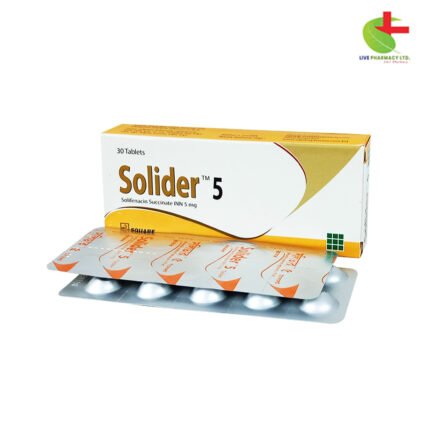Solider 10
300.00৳ Strip
- Solider (Solifenacin) is prescribed for managing symptoms of overactive bladder syndrome, such as urinary urgency and frequency.
- It acts as a muscarinic receptor antagonist, effectively inhibiting bladder muscle contractions.
- Initial recommended dose for adults is 5 mg daily, with the option to increase to 10 mg if necessary.
- Common side effects include dry mouth and constipation.
- Solider interacts with other anticholinergic medications and potent CYP3A4 inhibitors, necessitating careful management in patients with renal or hepatic impairment.
 Brand
Brand
|
Square Pharmaceuticals PLC |
|---|---|
 Generics
Generics
|
Solifenacin Succinate |
 Type
Type
|
Tablet |
Indications
Solifenacin is used to treat symptoms such as urge incontinence, increased urinary frequency, and urgency associated with overactive bladder syndrome.
Pharmacology
Solifenacin acts as a competitive antagonist of muscarinic receptors, with the highest affinity for M3, M1, and M2 receptors. By blocking the M3 receptor, it prevents contractions of the detrusor muscle in the bladder.
Dosage & Administration
For adults and the elderly, the recommended initial dose is 5 mg of Solifenacin Succinate once daily, which may be increased to 10 mg daily if necessary. It is not recommended for use in children due to lack of established safety and effectiveness.
Interactions
Solifenacin may interact with other medications possessing anticholinergic properties, potentially increasing both therapeutic and adverse effects. It should not be used concurrently with potent CYP3A4 inhibitors like Ketoconazole without dosage adjustment.
Side Effects
Common side effects include dry mouth, constipation, and nausea. Adverse effects are generally dose-dependent, with dry mouth being the most frequently reported.
Contraindications
Solifenacin is contraindicated in patients with hypersensitivity to solifenacin or its components, myasthenia gravis, urinary retention, uncontrolled narrow-angle glaucoma, severe gastrointestinal conditions, severe renal impairment, moderate hepatic impairment, and during treatment with strong CYP3A4 inhibitors.
Precautions
Special caution should be exercised in patients with bladder outflow obstruction, gastrointestinal disorders, severe renal or moderate hepatic impairment. It should be avoided in patients with specific medical conditions and during pregnancy or breastfeeding.
Use in Special Populations
Patients with severe renal impairment should not exceed a daily dose of 5 mg. Similarly, those with moderate hepatic impairment should also limit their daily intake to 5 mg.
Overdose Effects
In cases of overdose, which may result in severe anticholinergic effects, appropriate supportive measures should be taken. Symptomatic treatment can include activated charcoal and specific antidotes depending on symptoms.
Storage Conditions
Store Solifenacin tablets in a cool, dry place protected from light to maintain stability.













Reviews
There are no reviews yet.